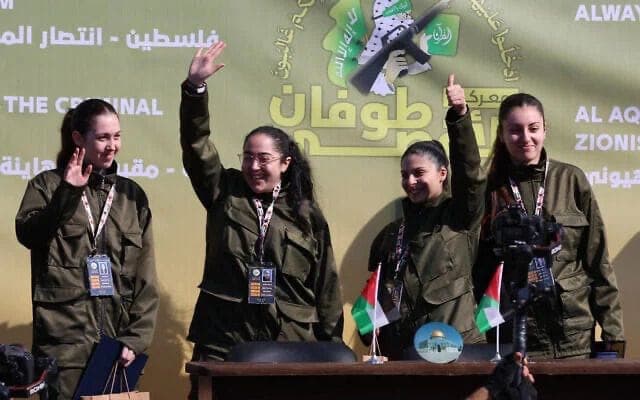Inside Hamas: Four Hostages Speak Out About Their Harrowing Ordeal
Shocking Secrets Revealed: What These 4 Former Hostages Endured in Hamas Captivity
The four released hostages, who were freed this Shabbat, Liri Albag, Daniela Gilboa, Naama Levy, and Karina Ariev share their harrowing experience in Gaza. Including receiving help and support from an older hostage who was killed in captivity. More details bellow.

Four of the women recently released from Hamas captivity have shared chilling details of their ordeal, recounting their time spent in tunnels and buildings across Gaza. They were moved between various locations by their captors, living in poor conditions and subjected to frequent humiliation. The hostages—Liri Albag, Daniela Gilboa, Naama Levy, and Karina Ariev—were held together for most of their captivity, alongside Agam Berger, who remains in Hamas custody.
The women described their initial days in captivity, when an elderly man ensured they had food and hygiene supplies, offering some semblance of care amid the chaos, the former hostages revealed he was murdered in captivity. However, their conditions worsened as they were moved around Gaza, often living in tunnels and civilian apartments Hamas terrorists moved them from one place to another, even within Gaza City, while disguising them as Arab women.. During their time in captivity, they were exposed to the ongoing conflict through Al Jazeera broadcasts, gaining knowledge of the developments in Gaza, including the tragic collapse of a building in December 2023 that killed 21 Israeli soldiers.
Although they were physically well when released, the women recalled the cruelty they faced from their captors, who referred to them as "the soldiers." Despite this, Liri Albag emerged as the group leader, taking on the responsibility of communicating with the Hamas militants. The captives were subjected to various forms of mistreatment, including being forced to cook for the terrorists, clean their toilets, and adhere to strict rules prohibiting them from showing emotion, such as holding hands or crying together.
Despite these hardships, the women found strength in each other, offering mutual support during moments of fear and uncertainty. They spoke of the times when food was scarce and the IDF's attacks on nearby locations created terrifying moments. “We supported each other,” they said, reflecting the solidarity that helped them endure the harsh conditions.
In a cynical display of propaganda, Hamas filmed and broadcast the hostages’ release, parading them on stage surrounded by militants. However, the released women made it clear that they were unshaken by this manipulation. “We showed them on stage that it didn’t bother us. We are stronger than that,” they declared.
The four women also reported that they had learned to speak Arabic during their captivity. In a moment of dark humor after their release, when asked by the helicopter crew to sit, they joked, “We don’t understand, speak to us in Arabic.”
Their testimony serves as a stark reminder of the horrors they endured at the hands of Hamas, as well as the lasting psychological impact of their captivity.